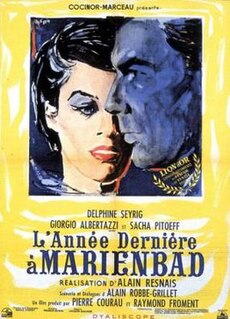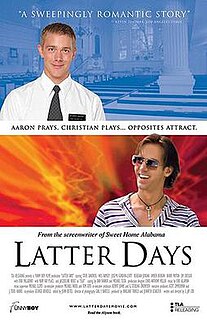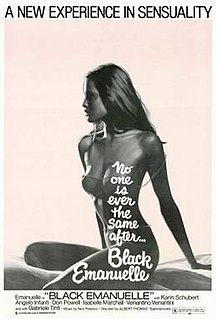
Michelangelo Antonioni was an Italian film director, screenwriter, editor, and painter. He is best known for his "trilogy on modernity and its discontents" — L'Avventura (1960), La Notte (1961), and L'Eclisse (1962) — as well as the English-language films Blowup (1966) and The Passenger (1975). His films have been described as "enigmatic and intricate mood pieces" that feature elusive plots, striking visual composition, and a preoccupation with modern landscapes. His work would substantially influence subsequent art cinema.

L'Année dernière à Marienbad is a 1961 French-Italian Left Bank film directed by Alain Resnais from a screenplay by Alain Robbe-Grillet.

A Man and a Woman is a 1966 French film written and directed by Claude Lelouch and starring Anouk Aimée and Jean-Louis Trintignant. Written by Lelouch and Pierre Uytterhoeven, the film is about a young widow and widower who meet by chance at their children's boarding school and whose budding relationship is complicated by the memories of their deceased spouses. The film is notable for its lush photography, which features frequent segues among full color, black-and-white, and sepia-toned shots, and for its memorable musical score by Francis Lai.

Claude Joséphine Rose "Claudia" Cardinale is an Italian film actress who starred in some of the most acclaimed European films of the 1960s and 1970s, mainly Italian or French, but also in many English-language films.

An art film is typically an independent film, aimed at a niche market rather than a mass market audience. It is "intended to be a serious, artistic work, often experimental and not designed for mass appeal", "made primarily for aesthetic reasons rather than commercial profit", and contains "unconventional or highly symbolic content".

Latter Days is a 2003 American romantic comedy-drama film about a gay relationship between a closeted Mormon missionary and his openly gay neighbor. The film was written and directed by C. Jay Cox and stars Steve Sandvoss as the missionary, Aaron, and Wes Ramsey as the neighbor, Christian. Joseph Gordon-Levitt appears as Elder Ryder, and Rebekah Johnson as Julie Taylor. Mary Kay Place, Khary Payton, Erik Palladino, Amber Benson, and Jacqueline Bisset have supporting roles.

Nights of Cabiria is a 1957 Italian drama film directed by Federico Fellini and starring Giulietta Masina, François Périer, and Amedeo Nazzari. Based on a story by Fellini, the film is about a prostitute in Rome who searches in vain for true love.

Black Emanuelle is an Italian softcore sexploitation film from 1975 directed by Bitto Albertini. This Africa set film was shot mostly in Kenya. The music was composed by Nico Fidenco. Black Emanuelle was followed by a number of sequels, all revolving around the erotic adventures of Mae Jordan, a globe-trotting, hedonistic investigative journalist and photographer known to her readers as "Emanuelle". Her character has been described as "a strong and independent woman, sexually proactive, at the centre of wealthy young and old white men of power, and involved in any sort of depraved set and situation."

Law of Desire is a 1987 Spanish comedy thriller film written and directed by Pedro Almodóvar. Starring Eusebio Poncela as Pablo, Carmen Maura as Tina and Antonio Banderas as Antonio. It was the first film Almodóvar made independently with his own production company El Deseo.

Massimo Ranieri is an Italian singer, actor, television presenter and director.

L'amore dei tre re is an opera in three acts by Italo Montemezzi. Its Italian-language libretto was written by playwright Sem Benelli who based it on his play of the same title.

Giuliano Sangiorgi is an Italian artist who has gained increasing fame as a singer, songwriter and composer, together with his rock band Negramaro.

Stefano Lelio Beniamino Accorsi is an Italian actor.

Luigi Comencini was an Italian film director. Together with Dino Risi, Ettore Scola and Mario Monicelli, he was considered among the masters of the commedia all'italiana genre.

Vittorio Caprioli was an Italian actor, film director and screenwriter. He appeared in 109 films between 1946 and 1990, mostly in French productions.

I Am Love is a 2009 Italian romantic drama film directed by Luca Guadagnino, set in Milan around the year 2000. Tilda Swinton plays a rich industrialist's wife who has an affair with a chef. It is the first installment in Guadagnino's self-described Desire trilogy, preceding A Bigger Splash (2015) and Call Me by Your Name (2017). Producers Swinton and Guadagnino developed the film together over an 11-year period. The film's soundtrack uses pre-existing compositions by John Adams.

Carmen Villani is a former Italian pop singer and actress. She had a recognisable voice and an outstanding musical sense. Villani was a versatile performer, featuring elements of gospel and blues. She is considered among the finest examples of the early beat music in Italy. She also collaborated with some of the top film scorers in Italy. Villani's fame was limited to her homeland, where she charted records and gave several performances broadcast nationwide by RAI. After her failure to chart hits in the early 1970s, she became an actress in commedia sexy all'italiana films.

Dolce Amore is a 2016 Philippine romantic drama television series directed by Mae Cruz-Alviar, Cathy Garcia-Molina and Richard Arellano, starring Liza Soberano and Enrique Gil. The series aired on ABS-CBN's Primetime Bida evening block and worldwide on The Filipino Channel from February 15, 2016, to August 26, 2016, replacing Pangako Sa 'Yo, and was replaced by Till I Met You.

Stadio is an Italian pop rock band formed in 1977. The members are Giovanni Pezzoli (drums), Roberto Drovandi, Andrea Fornili (guitar), and Gaetano Curreri.

Silvia Mazzieri is an Italian actress, especially known for her appearances in RAI television series.



















